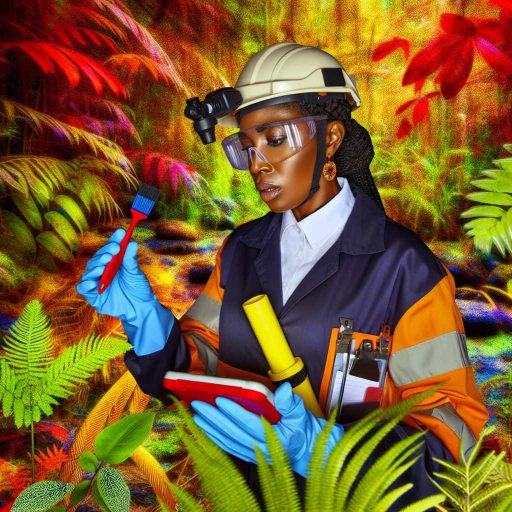Growing importance of environmental protection and sustainable development in Nigeria has led to a focus on innovations in environmental technology.
The need for innovative solutions to address environmental challenges in Nigeria is more pressing than ever.
Overview of Current Environmental Issues in Nigeria:
Nigeria, like many other countries, is facing a host of environmental challenges that are putting pressure on its natural resources and the health of its population.
Some of the major environmental issues facing Nigeria include pollution, deforestation, and climate change.
Pollution:
- One of the primary environmental concerns in Nigeria is pollution, which is rampant in both urban and rural areas.
- Major sources of pollution include industrial activities, inadequate waste management, and vehicular emissions.
- This has led to air, water, and soil pollution, impacting the health and well-being of the population.
Deforestation:
- Deforestation is another critical issue in Nigeria, with rapid rates of tree cutting for timber, agriculture, and urbanization.
- Loss of forest cover has resulted in habitat destruction, soil erosion, and loss of biodiversity.
- Deforestation also contributes to climate change and exacerbates the impact of natural disasters.
Climate Change:
- Climate change is a global issue that is affecting Nigeria through rising temperatures, changing rainfall patterns, and extreme weather events.
- These changes have a significant impact on agriculture, water resources, and public health in the country.
- Nigeria is particularly vulnerable to the impacts of climate change due to its reliance on natural resources for livelihoods.
It is crucial to address these environmental issues promptly and effectively to safeguard the future of Nigeria.
Innovative solutions are needed to combat these challenges and ensure sustainable development in the country.
Existing innovations in Nigeria’s environmental technology:
Nigeria has seen a rise in innovative technologies to combat environmental challenges.
The use of renewable energy sources like solar panels is gaining popularity.
Waste management systems are being improved with the introduction of recycling plants.
Water purification technologies are being implemented to provide clean drinking water.
The development of air quality monitoring systems is helping to reduce pollution levels.
Explore current initiatives and technologies being used in Nigeria:
- The Lagos Waste Management Authority (LAWMA) has implemented waste sorting and recycling programs.
- The Nigerian Conservation Foundation (NCF) is working on reforestation projects to combat deforestation.
- The Nigerian National Petroleum Corporation (NNPC) is investing in clean energy projects.
- The Federal Ministry of Environment is actively promoting green initiatives across the country.
Highlight successful projects or solutions that have made a positive impact:
- The Ogoni Clean-up Project is a notable success in cleaning up oil spills in the Niger Delta region.
- The introduction of bio-digester toilets in rural areas has improved sanitation and reduced water contamination.
- The adoption of energy-efficient stoves in cooking practices has reduced carbon emissions and indoor air pollution.
- The implementation of integrated waste management systems has led to cleaner and healthier communities.
Discuss the key players and organizations involved in developing these innovations:
The government plays a crucial role in setting policies and regulations to support environmental technology initiatives.
Non-governmental organizations (NGOs) like the Environmental Rights Action/Friends of the Earth Nigeria (ERA/FoEN) are actively involved in advocacy and awareness campaigns.
Private sector companies are investing in research and development of sustainable technologies for environmental protection.
Academic institutions and research centers are conducting studies to further advance environmental technologies in Nigeria.
Nigeria is making significant strides in adopting innovative technologies to address environmental challenges and create a sustainable future for its citizens.
You Might Also Like: Challenges in Environmental Management Tech in Nigeria
Challenges and Barriers to Implementing Environmental Innovations in Nigeria:
Identifying obstacles that hinder the widespread adoption of environmentally friendly technologies in Nigeria is crucial for understanding the challenges faced by innovators in the environmental technology sector.
Below are some of the main issues:
Funding Constraints:
- Lack of access to capital for research and development of new environmental technologies.
- High cost of implementing sustainable solutions, making it difficult for small businesses to invest in eco-friendly practices.
- Lack of government support and funding for green initiatives and projects.
Lack of Awareness:
- Low levels of awareness among the population about the importance of environmental conservation and sustainability.
- Lack of education and information about the benefits of using green technologies and practices.
- Inadequate public campaigns and outreach programs to promote eco-friendly solutions.
Regulatory Challenges:
- Complex and ambiguous regulatory frameworks that hinder the adoption of environmental innovations.
- Inconsistent enforcement of environmental laws and regulations by government agencies.
- Bureaucratic red tape and delays in obtaining permits and approvals for green projects.
It is essential to provide examples or case studies to illustrate the difficulties faced by innovators in the environmental technology sector.
One notable example is the challenges faced by renewable energy companies in Nigeria.
Renewable energy companies in Nigeria often struggle to secure funding for their projects due to limited access to capital and investment opportunities.
Many investors are hesitant to finance green energy projects in Nigeria due to perceived risks and uncertainties in the market.
Additionally, regulatory challenges such as delays in obtaining permits and approvals from government agencies further hinder the growth of the renewable energy sector in Nigeria.
Bureaucratic red tape and inconsistencies in government policies create barriers for innovators in the green technology space.
Despite these challenges, there is a growing recognition of the importance of environmental innovation in Nigeria.
Stakeholders across various sectors are working together to address funding constraints, increase awareness about green technologies, and advocate for supportive regulatory frameworks that promote sustainability and eco-friendly practices.
By overcoming these barriers and fostering a supportive ecosystem for environmental innovations, Nigeria can unlock its full potential in driving sustainable development and addressing pressing environmental challenges facing the country.
Gain More Insights: How to Start a Career in Environmental Safety
Areas of Opportunity
Renewable energy presents a great opportunity in Nigeria.
Nigeria has abundant renewable energy sources such as solar, wind, and biomass.
These sources can be tapped for clean energy production.
Waste management solutions are critically needed.
There is a growing waste problem in urban areas.
Water conservation technologies must be developed.
Water scarcity has become a major concern in Nigeria.
Contribution to Economic Growth
Advancements in environmental technology will help Nigeria’s economy.
Investing in clean energy projects reduces dependence on fossil fuels.
A more sustainable energy system can be created in the country.
This shift can attract foreign investment as well.
Transform Your Career with Expert Guidance
Get personalized mentorship consulting that’s tailored to your unique path. Our expert advice is actionable and exclusive.
Get StartedNew job opportunities will arise in the sector.
Job Creation
The growth of the environmental technology sector leads to job creation.
New jobs will emerge in engineering, research and development, project management, and sustainable design.
As demand for green technologies increases, skilled professionals will be needed.
These professionals will be needed to design, install, and maintain these systems.
Nigeria’s environmental technology sector holds immense potential for growth and development.
By focusing on renewable energy, waste management, and water conservation,
the country can address environmental challenges.
This strategy will drive economic growth and create new opportunities for citizens.
Learn More: Nigeria’s Efforts in Combating Deforestation

Role of government policies and partnerships in promoting environmental innovations
Government regulations and incentives play a crucial role in shaping the landscape of environmental technology in Nigeria.
These policies provide a framework for businesses to operate sustainably and develop innovative solutions to environmental challenges.
Impact of government regulations and incentives
- Regulations set standards for environmental performance and compliance, driving companies to invest in technology that reduces their environmental footprint.
- Incentives such as tax breaks and grants encourage businesses to innovate in green technologies, making it financially beneficial to adopt sustainable practices.
- Government policies create a level playing field for businesses by ensuring that environmental costs are internalized, forcing companies to account for their impact on the environment.
Importance of public-private partnerships
- Public-private partnerships are essential for fostering innovation and collaboration in the environmental technology sector.
- By partnering with the government, businesses can access funding, expertise, and resources that are necessary for developing and scaling up innovative technologies.
- Collaboration between the public and private sectors allows for the sharing of knowledge and best practices, leading to more effective solutions to environmental challenges.
Successful examples of government-led initiatives
- The Nigerian government’s Renewable Energy Master Plan aims to increase the share of renewable energy sources in the country’s energy mix, driving investment in clean technology.
- The National Climate Change Policy provides a roadmap for addressing climate change through mitigation and adaptation strategies, promoting the development of environmentally friendly technologies.
- The Nigerian Erosion and Watershed Management Project (NEWMAP) is a multi-agency initiative that focuses on soil erosion and watershed management, showcasing successful collaboration between government agencies and private partners.
Government policies and partnerships are instrumental in promoting environmental innovations in Nigeria.
By creating a conducive regulatory environment and fostering collaboration between the public and private sectors, the government can drive the development of sustainable technologies that address environmental challenges and contribute to a greener future for the country.
See Related Content: Sustainable Practices in Environmental Safety
Case Studies of Successful Environmental Innovations in Nigeria
One great example of environmental innovation in Nigeria is the Lagos Waste Management Authority (LAWMA).
LAWMA has implemented various recycling programs to reduce waste and promote a cleaner environment.
With the introduction of waste segregation at source, LAWMA has been able to divert tons of waste from landfills.
Implementation and Outcomes
LAWMA’s recycling initiatives involve educating residents about the importance of recycling and providing bins for sorting waste.
The outcomes have been significant, with a noticeable reduction in waste in landfills and cleaner streets in Lagos.
By partnering with recycling companies, LAWMA has also created job opportunities for many Nigerians in the waste management sector.
Success Stories
LAWMA’s success has inspired other cities in Nigeria to replicate their recycling programs and initiatives.
The positive impact on the environment and the economy has led to an increase in environmental awareness among Nigerians.
LAWMA’s efforts have shown that with proper planning and implementation, significant change can be achieved in environmental sustainability.
Overall, these case studies demonstrate the power of innovation in addressing environmental challenges in Nigeria.
By sharing these success stories, we hope to encourage other innovators in Nigeria to continue their efforts in creating a greener and more sustainable future for the country.
Implications of Environmental Innovation in Nigeria
Innovation in Nigeria’s environmental technology sector is crucial for sustainable development.
The key points discussed highlight the potential for significant positive impact on the environment.
It is imperative for stakeholders to increase collaboration, investment, and support for environmental technology initiatives in Nigeria.
By working together, we can drive positive change and create a healthier environment for future generations.
Looking ahead, there is a positive outlook on the future of environmental innovation in Nigeria.
With continued efforts and investment, the country has the potential to lead the way in sustainable development and environmental protection.
Let us all join hands and commit to supporting and nurturing environmental innovation in Nigeria for a better and greener tomorrow.
Together, we can make a difference and create a more sustainable future for all.
Additional Resources
Patents on environment technologies | OECD
Innovative Growth and Climate: A Policy Brief for Nigeria’s …




